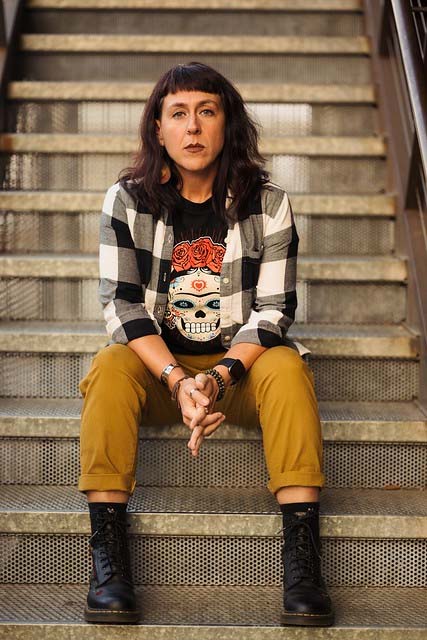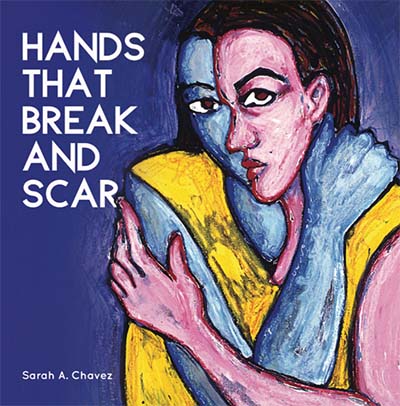
The Road Taken
Assistant Teaching Professor Sarah A. Chavez had a decision to make, choosing between two life paths. The road she chose brought her to UW Tacoma.
“I tell this to my students when they’re struggling over majors,” says UW Tacoma Assistant Teaching Professor Sarah A. Chavez. “You can always change majors and maybe that adds an extra quarter or two, but better to make a change now and be happy than to force yourself into something you picked when you were 18.”
Chavez is speaking from experience. Born in California, Chavez grew up in Fresno. "When I was a kid, both my parents had financial issues," she said. "My maternal grandfather was very much a product of the Great Depression in his approach to money, and my paternal grandparents were farm laborers initially, so money and a sense of security really shaped how I thought about the world."

Chavez's world view wasn't only affected by financial differences between the two sides of their family, but also culture. "My dad is Mexican and my mom is white," Chavez said. "When our parents divorced, my sister and I lived with our mom. That separation exacerbated existing cultural tensions." This mixed identity pulled at Chavez and would be something she explored in her work, but that comes later.
First, Chavez had a decision to make. “My dad’s side of the family is all about work — meaningful work — which is part of the reason why I’ve had a job since I was 14,” she said. “On my mom’s side there was just this nebulous, you go to college and make money.”
In a twist on Robert Frost, Chavez saw two paths diverging, and opted to make a third, between the others. “When I originally went to college, my idea was to get a job where I could be financially secure,” she said. “So, I went into psychology. I figured I was good at talking to people and both of my parents were social workers. It seemed like a natural choice.”
A natural choice, perhaps, but not the right choice. "I realized I liked the idea of it, but didn't want to talk to people about their problems all day,” said Chavez. "I wasn't sure what else to do.” Chavez enjoyed writing but didn’t see how she could make a living doing it. “It was through taking a women’s literature class and a few creative writing workshops that professors started to read my work and encouraged me to change majors and go to graduate school to pursue writing,” she said.
Chavez took the advice. “There were no artists in my family,” she said. “I had a very 19-year-old version of what it meant to be ‘arty’ which included coffee shops and people sitting around talking about poetry.”
As it turns out, writing is more than turtle necks and dark-clad figures snapping their fingers in low light. “I met a bunch of other writers, people in the creative writing graduate program,” said Chavez. “I got pulled in.” Chavez changed her major and took a position with the writing center on campus.
“There’s something about Tacoma. When I was here for my interview I just felt super comfortable.”
Following graduation, Chavez worked a number of writing-related jobs. “I was an assistant grant writer and was also a content writer for an accounting firm,” she said. At one point, Chavez took a full-time position as an administrative assistant with a drug and alcohol recovery home run by a consortium of Native American tribes. “I didn’t love being an administrative assistant but I did get the chance to tutor folks who were trying to get into college,” she said.
Until that point Chavez had lived in Fresno her entire life. “I started to feel a little claustrophobic,” she said. “I wanted to go to grad school but knew I’d never make it if I stayed home. I love my family deeply, but I needed space to be myself.”
When it came to choosing a graduate school, Chavez had some requirements that needed to be met. The school would need to have a creative writing master’s or MFA for her and a Ph.D. for her partner, and they both needed funding. “Ball State was the first place that offered us both a teaching assistantship,” said Chavez.
Ball State University is located in Muncie, Indiana, a city with a population of just over 65,000. “The university had a great English program,” said Chavez. “The distance helped me see myself, my cultural roles, my family and Fresno much more clearly.”

Chavez completed her master’s in creative writing with an emphasis on poetry. She remained at Ball State for a few years while her partner finished his Ph.D. “I taught English, first-year writing and some literature through the university’s correctional education program,” she said. “Those classes were on site at the facilities, but I also separately taught full-time on campus.”
Her partner’s Ph.D. coursework completed, Chavez opted to pursue her own doctoral degree. She applied to different schools and got accepted to the University of Southern California and the University of Nebraska-Lincoln. “I didn’t know you could negotiate grad programs,” she said. “Thankfully, I got some mentorship.” Chavez pushed for more funding – and got it. “Both places were offering me the same, but the cost of living in Lincoln was lower, plus they had the oldest Ph.D. program for creative writing in the country,” she said.
Chavez went on to earn a Ph.D. from the University of Nebraska-Lincoln, the flagship of the UN system, in English & Ethnic Studies. “I ended up getting a dual-focused Ph.D. because I had these wonderful and supportive Latino faculty members, Joy Castro and Amelia Montes,” said Chavez.
“A student sent me this beautiful e-mail about how she’d never had a Latina professor before and how moving it was for her ... to have representation at the front of the room.”
Chavez left Lincoln to take a visiting assistant professor position at Marshall University in West Virginia. She stayed for four years before deciding to make a switch. “I really wanted to be closer to home for cultural reasons, but also for family health reasons,” she said. “I found myself flying back and forth to California pretty frequently, which is not inexpensive from West Virginia.”
Washington is closer to California than West Virginia. “I saw this position open at UW Tacoma,” she said. “It was an interdisciplinary job, a fact that I loved. I would get to teach poetry and creative nonfiction, and be part of the new Latino Studies minor that was in the works."
Chavez started at UW Tacoma in the fall of 2018. “One of the things I’ve loved about being at UWT is the opportunity to put creative writing in conversation with Latino Studies,” she said. “It's exciting to be in community with people who share cultural similarities and students who deserve to see themselves represented in academic and artistic spaces.”
Identity is a big part of Chavez’s work, both in and out of the classroom. “The students that I work with are so smart and engaged,” she said. “They all deserve to read about their cultures, and the BIPOC and Latinx/Chicanx students deserve to see their history as multifaceted. So many of them are only seeing media representations as laborers or migrant workers, but they are also doctors and lawyers, writers and painters."
Chavez is a prolific author. She has published four collections of poetry and her work has been featured in a number of journals. “Writing allows me to explore culture in a way that is maybe educational for some people and maybe representational for others,” she said. “I highlight and center identity and intersectionality in my writing and in my writing classes because those things affect how we engage with each other.”
Listen to Dr. Chavez on Paw’d Defiance
Among other things, Sarah A. Chavez studies the performative aspects of death, namely the elegy, eulogy and oibituary. In a recent episode of Paw’d Defiance, the UW Tacoma podcast, she talks about how she got interested in these forms, why they are important and the attributes of each. She also discusses what makes a “good” elegy, eulogy or obituary. Finally, Chavez ponders how she would like to be celebrated after she passes.



